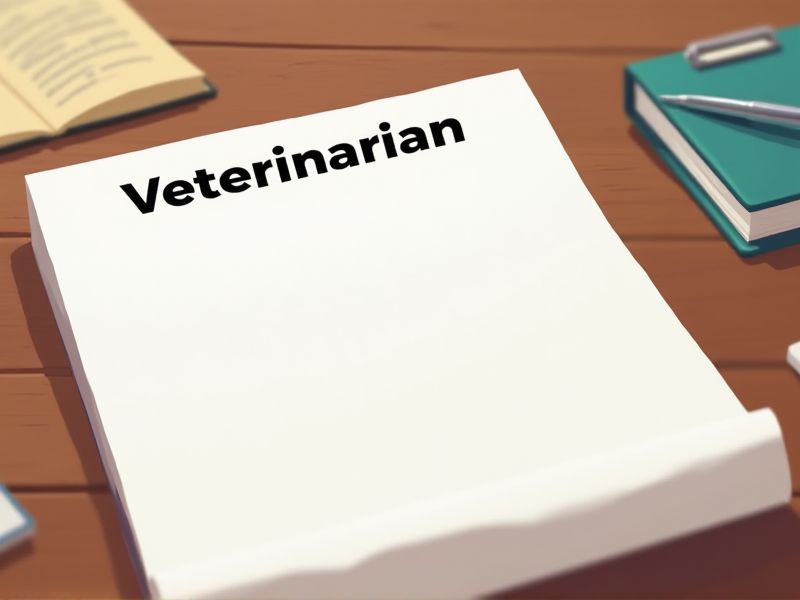
Veterinarians require specific certifications to ensure they can provide safe and effective care for animals, as these credentials attest to their expertise in specialized areas. Regulatory standards and advancements in veterinary medicine demand ongoing education and validation of skills. Certifications serve as a benchmark for quality assurance, fostering trust among clients and colleagues. Important certifications for veterinarians include those recognized by regulatory boards and specialized veterinary associations.
State Veterinary Medical License
Holding a State Veterinary Medical License ensures that veterinarians have met the necessary educational and professional standards to practice safely and ethically within a particular state. Without the license, veterinarians are legally restricted from diagnosing, treating, or performing surgeries on animals, which helps protect animal welfare and public health. The license helps maintain consistent industry standards by requiring ongoing education to keep veterinarians updated on the latest medical advancements. It also provides a mechanism for regulatory bodies to enforce accountability and address grievances, maintaining public trust in veterinary services.
National Veterinary Licensing Examination (NAVLE) Certification
Obtaining the NAVLE certification ensures that a veterinarian has met the basic competency and standards required to practice veterinary medicine effectively. Regulatory bodies require this certification to uphold the integrity and quality of veterinary services within a jurisdiction. The NAVLE acts as a benchmark to assess a veterinarian's preparedness in handling diverse animal healthcare situations. Without this certification, a veterinarian cannot legally practice, limiting their ability to serve clients and animals professionally.
DEA Registration for Controlled Substance Handling
Veterinarians need DEA registration to lawfully handle controlled substances, ensuring they can prescribe necessary medications for animal care. Such registration helps in preventing misuse and diversion of drugs, maintaining public safety. The DEA registration acts as a regulatory compliance measure, allowing monitoring and accountability for controlled substance use. It supports the veterinarian's role in contributing to responsible animal welfare while adhering to law.
Board Certification - American College of Veterinary Internal Medicine (ACVIM)
Board certification from the American College of Veterinary Internal Medicine (ACVIM) leads to enhanced expertise in specialized medical areas, ensuring veterinarians can provide advanced care for complex animal health issues. It often results in increased trust and credibility with pet owners, who prefer veterinarians with recognized qualifications. The certification usually allows veterinarians access to a network of professionals and resources, facilitating continuous learning and collaboration. This recognition often improves career opportunities and pathways within the veterinary field by distinguishing certified specialists from general practitioners.
Board Certification - American College of Veterinary Surgeons (ACVS)
Veterinarians with Board Certification from the American College of Veterinary Surgeons (ACVS) demonstrate advanced expertise and skills in performing complex surgical procedures. This certification ensures that these veterinarians meet high standards, gaining trust from clients seeking specialized care for their animals. Increased demand for specialized veterinary care has made Board Certification a valuable asset when improving clinical outcomes. Hospitals and clinics often favor employing ACVS-certified surgeons, which can enhance professional opportunities and career growth.
American Veterinary Medical Association (AVMA) Accreditation Certificate
The AVMA Accreditation Certificate ensures that veterinary programs meet established standards of education and training, which directly affects the competency of graduates. Without this accreditation, veterinarians might lack the necessary qualifications to acquire licensure to practice professionally in the United States. Veterinary employers often prioritize applicants from AVMA-accredited programs due to the assurance of quality education. Accreditation also facilitates international recognition and the ability to pursue further professional opportunities globally.
American Animal Hospital Association (AAHA) Accreditation Certification
AAHA Accreditation Certification establishes a set of comprehensive guidelines aimed at ensuring high-quality veterinary care and operational excellence within animal hospitals. Achieving this accreditation indicates that a veterinary practice adheres to over 900 standards covering patient care, cleanliness, safety, equipment, and medical protocols. Accredited hospitals are more likely to attract clients who prioritize their pets' well-being, as it provides assurance of adherence to best practices and continual improvement. Certification often results in improved organizational efficiency and professional development for veterinary staff, contributing to enhanced care outcomes.
Certified Veterinary Practitioner Certificate
The Certified Veterinary Practitioner Certificate enhances a veterinarian's expertise in a specific field, which leads to improved patient care and outcomes. Having this certification often results in increased trust and credibility from pet owners, which can elevate a veterinarian's professional reputation. The certificate can differentiate a veterinarian in a competitive job market, providing more lucrative career opportunities. This certification often results in higher salary potential due to the specialized skills gained.
Veterinary CPR and Emergency Care Certification
Veterinary CPR and Emergency Care Certification equips veterinarians with the skills necessary to manage critical situations effectively, thereby increasing survival rates for animals experiencing cardiac or respiratory distress. This certification ensures veterinarians stay updated with the latest techniques and protocols, improving the overall quality of veterinary care. Acquiring this certification can lead to enhanced trust and confidence from pet owners, who seek reliable and competent professionals for emergency situations. Certified veterinarians are better positioned to handle emergencies swiftly, potentially reducing long-term health complications in animals.
Veterinary Practice Management Certification
Veterinary Practice Management Certification equips veterinarians with essential business skills, enhancing their ability to effectively run and manage a practice. Trained management reduces operational inefficiencies, leading to increased profitability and better resource allocation. Staff turnover decreases when management practices foster a supportive work environment. Clients experience improved satisfaction owing to streamlined services and enhanced operational efficiency.
Summary
When you obtain certifications as a Veterinarian, your career prospects significantly improve. This professional enhancement enables deeper knowledge and skill validation, leading to increased credibility among peers and clients. As demand for specialized services grows, certified veterinarians often see an increase in client trust and patient volume. Greater expertise can result in better job opportunities and potentially higher salaries within the field.
